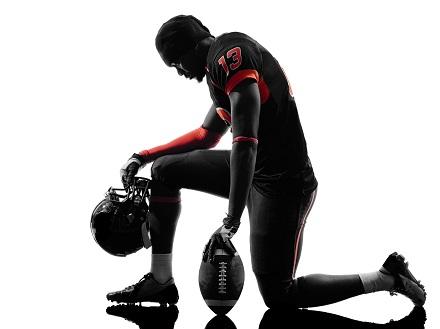

The IOC, however, wants athletes to know that on its particular playing field, there is no freedom from the consequences of their speech.
The IOC has become the latest athletic organization to crack down on political protests by athletes, publishing new rules governing when and how competitors can express political opinions. Will they filter down to lower levels of sports?
The new rules state that athletes are barred from conducting protests or demonstrations on the field of play, in the Olympic Village, during medal ceremonies, or during the opening or closing ceremonies of the games.
The rule gives several examples of prohibited protest, including messages on armbands or signs, hand gestures with political meaning, kneeling, or refusal to follow ceremony protocol. Athletes will be allowed to express political opinions in media gatherings, press conferences and mixed-zone interviews, as well as on social media.
Inside the Games reported that the IOC’s position was clearly defined.
“They (the Olympics) are not and must never be a platform to advance political or any other divisive ends,” IOC President Thomas Bach said last week in Lausanne to an audience that included the heads of international sports federations. “Our political neutrality is undermined whenever organizations or individuals attempt to use the Olympic Games as a stage for their own agendas, as legitimate as they may be.”
Over the years, athletes have generated headlines because of protests, either subtle or overt. In 1968, American sprinters Tommie Smith and John Carlos raised their fists on the podium at the 1968 Mexico City Olympics. (They also went shoeless, representing poverty, and they, along with other athletes, wore human rights badges). In 2019 at the Pan Am Games, hammer thrower Gwen Berry raised a fist and fencer Race Imboden took a knee during medal ceremonies, and both were subsequently put on probation by the USOC for 12 months, which will cover the Olympics this summer. (The USOC has also warned that those who make similar gestures at the Games in Tokyo will be strictly sanctioned).
An article in Vox points out that athletes could still choose to defy the rules but would risk facing three layers of disciplinary action — from the IOC, their home nation’s Olympic Committee, and their sport’s international governing body.
Within the U.S., protests at sports have been common, from NBA players wearing warmup shirts imprinted with “I can’t breathe,” a reference to Eric Garner, who died following police brutality, to the NFL’s Colin Kaepernick and several of his teammates who knelt during the national anthem to protest police violence against black people in the US in 2016.

More recently, notes Vox, “the NBA was criticized for cracking down on player and coach support for protesters in Hong Kong in order to preserve its access to the Chinese market. Houston Rockets general manager Daryl Morey tweeted, “fight for freedom, stand with Hong Kong.” The tweet set off a firestorm that included denunciation from the Chinese Consulate in Houston, and an apology from the NBA league office; the Rockets were reportedly at one point considering firing him.”
In 2018, ESPN reviewed the policies of multiple NGBs with regard to protests, such as those staged during the National Anthem. Some, like the NHL, allow for peaceful protests, some take a harder line.
In the lower levels of sports, however, there are more shades of grey. In college sports, there were no recorded bylaws pertaining to the national anthem, according to NCAA associate director of public and media relations Gail Dent. Dent added that student-athletes are expected to follow sport-specific tournament policies.
The behavior of students at the high school level may be governed by the high school athletic association, or the schools themselves. In a wide-ranging article, the Hartford Courant interviewed athletes, coaches and owners of events. Some of the most interesting insights came at the youth level.
When members of the Bulkeley High School football team wanted take a knee during the national anthem before a game last year, similar to Kaepernick, to protest police brutality and racial injustice, "We called the boys in and asked them what was their reasoning," Bulkeley athletic director Diane Callis said. "They do have a right to freedom of speech, and we can't deny that but we were concerned about their reasoning. All of them spoke eloquently about their beliefs. My principal said, “Then you have to walk the walk. You're not just taking the knee because you want to be in the newspaper or on TV. You're doing your homework, you're in class on a team, you lead by example. You show people I'm against what's going on, but I'm responsible and a respectable young person who wants to do something with their life."
At the football game, the players faced the flag and knelt.
"The next game, every single kid was back up standing," Callis said. "We gave them a chance to have a way to peacefully protest."

